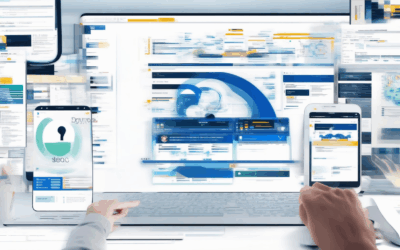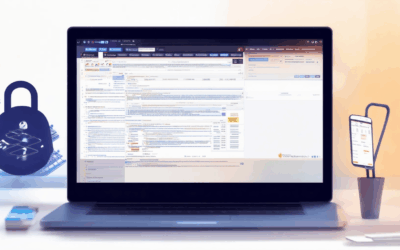In today’s interconnected world, our digital identities are more exposed than ever before. From social media profiles to financial transactions, our online footprints leave behind a trail of data that can be vulnerable to misuse. Protecting your online identity has become a vital concern in an era where privacy breaches can have serious real-world consequences. Whether it’s safeguarding your personal information, securing your accounts, or avoiding falling victim to scams, understanding how to protect yourself online is no longer optional but essential. This guide offers practical tips and strategies to help you navigate the complexities of digital security, ensuring your personal data remains safe and sound. By following these essential tips, you can take proactive measures to shield your digital self from potential threats, allowing you to enjoy the benefits of the internet with confidence and peace of mind.
Key Takeaways
– Use unique usernames and email addresses to prevent identity theft and keep your information organized.
– Create strong, complex passwords to secure your accounts and consider using a password manager for added convenience.
– Enable two-factor authentication (2FA) for critical accounts to add an extra layer of security.
– Avoid oversharing personal information online to minimize the risk of identity theft.
– Regularly update your software and devices to patch vulnerabilities and stay protected.
– Monitor your digital footprint by checking your online presence for any unintended exposure.
– Use privacy-focused browsers and tools, like BlindBrowser, to enhance your online security.
– Be cautious with public Wi-Fi and limit sensitive activities to avoid potential threats.
– Shred unnecessary accounts to reduce the risk of unauthorized access.
– Educate yourself and others about cybersecurity threats to stay informed and protected online.

Protecting Your Online Identity: Essential Tips for Digital Safety
- Use strong, unique passwords for every account and consider using a password manager to keep track of them securely.
- Enable two-factor authentication (2FA) for your critical accounts to add an extra layer of security.
- Use hardware security keys for added protection, especially for your most sensitive accounts like email or banking.
- Turn on account monitoring alerts through your bank or credit card provider to detect unauthorized transactions quickly.
- Avoid sharing your personal information, such as phone number or address, unnecessarily online.
- Utilize privacy-focused browsers and tools like BlindBrowser to minimize tracking and data collection.
- Regularly update your software, including operating systems and apps, to patch vulnerabilities that could expose your data.
- Review your social media settings to limit who can see your location and personal details.
- Educate yourself about phishing tactics and verify the authenticity of emails or messages before clicking on links or providing information.
- Consider using encrypted communication methods like Signal or WhatsApp for sensitive conversations to prevent data interception.
By following these steps, you can significantly enhance your online security and protect your digital identity effectively.
How Can I Protect My Online Identity?
Protecting your online identity is crucial in today’s digital age. Here are some essential steps to safeguard your personal information and secure your digital presence:
- Use Strong Passwords:** Create complex passwords with a mix of letters, numbers, and symbols. Consider using a password manager to store and organize them securely.
- Enable Two-Factor Authentication (2FA):** Add an extra layer of security to your accounts by enabling 2FA. This prevents unauthorized access even if someone knows your password.
- Be Cautious on Public Wi-Fi:** Avoid sensitive transactions or sharing personal information over public networks. Use a VPN for added protection when connecting to unknown networks.
- Regularly Update Software:** Keep your operating systems, browsers, and apps updated to patch vulnerabilities that could expose your data.
- Review Privacy Settings:** Check and adjust your privacy settings on social media platforms and other accounts to limit who can see your information.
- Use a VPN:** A Virtual Private Network helps hide your IP address and encrypts your internet traffic, adding an extra layer of anonymity.
- Monitor Your Devices:** Enable tracking for your devices to locate them if lost and set up remote wiping options in case of theft.
- Check for Data Breaches:** Regularly monitor your email and credit card statements for signs of fraud or unauthorized transactions.
- Backup Your Data:** Regularly back up important files to an external drive or cloud storage to prevent loss of personal information due to hacking or accidents.
- Stay Informed About Scams:** Keep an eye out for phishing attempts, scams, and fraudulent emails that target personal information.
By following these steps, you can significantly reduce the risk of identity theft and ensure your online activities remain secure. Remember, online security is an ongoing process that requires constant vigilance and adaptation to new threats.

Top Tips to Protect Your Online Identity
- Use Strong Passwords: Create unique and complex passwords for every account. Consider using a passphrase based on meaningful personal information that you can remember, then convert it into a random string of characters using a password manager. For example, “YourDogLovesSunshine2023” becomes “Y0urD0gLv3sunsh1n3$123”. [Learn more](https://blindbrowser.com/password-manager)
- Enable Two-Factor Authentication: Add an extra layer of security by enabling 2FA for your accounts. This requires a second form of verification, often a code sent to your phone or via an authenticator app. [Set Up 2FA](https://blindbrowser.com/two-factor-authentication)
- Regularly Update Software: Keep all your devices, apps, and operating systems updated to patch vulnerabilities. Manufacturers regularly release updates to fix security flaws, so ensure your software is up to date. [Update Software](https://blindbrowser.com/security-updates)
- Encrypt Sensitive Data: Use end-to-end encryption for sensitive information stored online. Look for the “https://” prefix in URLs and verify the padlock icon in your browser for secure connections. [Secure Connections](https://blindbrowser.com/encryption)
- Be Cautious with Public Wi-Fi: Avoid transmitting sensitive information over public Wi-Fi networks. Use a VPN (Virtual Private Network) to encrypt your connection and protect your data from potential eavesdroppers. [VPN Guide](https://blindbrowser.com/vpn)
- Monitor Account Activity: Regularly check your accounts for suspicious activity. Enable alerts for login attempts, transactions, and changes to your personal information to spot unauthorized access early. [Account Alerts](https://blindbrowser.com/account-alerts)
- Backup Your Data: Regularly back up important data to an external drive or cloud storage. This ensures you can recover lost or stolen information in case of a security breach. [Data Backup](https://blindbrowser.com/data-backup)
- Avoid Reusing Passwords: Never reuse passwords across multiple accounts. Use a unique password for each service to minimize the impact if one account is compromised. Combine this with a password manager to keep track of your credentials. [Password Manager Tips](https://blindbrowser.com/password-manager)
- Educate Yourself About Phishing Attacks: Stay informed about common phishing tactics and scams. Learn to recognize suspicious emails, messages, and websites that attempt to trick you into revealing personal information. [Phishing Awareness](https://blindbrowser.com/phishing-awareness)
- Use Privacy-Focused Browsers and Extensions: Install browsers and extensions that prioritize privacy. Tools like BlindBrowser.com offer built-in features to block trackers, manage cookies, and enhance overall online privacy. [BlindBrowser Features](https://blindbrowser.com/features)

Best Tips to Protect Your Online Identity
Here are the most effective strategies to safeguard your online identity:
- Use Unique Usernames and Email Addresses
We recommend creating separate accounts for different purposes. This helps prevent identity theft and keeps your personal information organized. BlindBrowser.com suggests generating multiple usernames and email addresses for various platforms to maintain privacy. - Create Strong, Complex Passwords
A password is your first line of defense. Use a combination of letters, numbers, and special characters. BlindBrowser’s password generator can help you create secure passwords for every account. - Enable Two-Factor Authentication (2FA)
Add an extra layer of security by enabling 2FA for your critical accounts. This ensures that even if someone obtains your password, they cannot access your account without your phone or a trusted device. Learn more about securing your accounts with BlindBrowser’s guide. - Avoid Oversharing Personal Information
Refrain from sharing your full name, address, phone number, or financial details on public platforms. BlindBrowser emphasizes protecting sensitive data to minimize the risk of identity theft. - Regularly Update Software and Devices
Keep your operating systems, apps, and devices updated to patch vulnerabilities. BlindBrowser’s security blog highlights the importance of staying current with software updates to defend against cyber threats. - Monitor Your Digital Footprint
Regularly check your online presence by searching for your name and personal details. BlindBrowser provides tools to help you manage and secure your online reputation. - Use Privacy-Focused Browsers and Tools
Consider using browsers and tools designed for privacy, such as BlindBrowser, to enhance your online security. These platforms offer features like tracker blocking and encrypted connections to keep your activities private. - Be Cautious With Public Wi-Fi
Limit sensitive activities, like banking or shopping, when connected to public Wi-Fi. BlindBrowser’s cybersecurity tips advise using a VPN for added protection when accessing vulnerable networks. - Shred Unnecessary Accounts
Periodically review and close accounts you no longer need. This reduces the risk of unauthorized access to your personal information. BlindBrowser’s resource library explains how to securely delete old accounts. - Educate Yourself and Others
Stay informed about the latest cybersecurity threats and share this knowledge with friends and family. BlindBrowser offers educational materials to help everyone understand and protect their online identities.
By following these tips, you can significantly enhance your online security and protect your identity. Remember, vigilance and proactive measures are key to staying safe in the digital world.
Protecting Your Online Identity: A Comprehensive Guide
Protecting your online identity is crucial in today’s digital age. Here are proven strategies to safeguard your personal information:
- Use Unique Passwords:** Create complex, unique passwords for every account. Combine letters, numbers, and symbols for maximum security. Consider using a password manager to store and organize your credentials securely.
- Enable Two-Factor Authentication (2FA):** Add an extra layer of protection by enabling 2FA for your accounts. This requires a second form of verification, such as a code sent to your phone or via an authenticator app.
- Encrypt Connections:** Always use HTTPS when browsing to ensure data encryption between your device and the website. Look for the padlock icon in your browser to verify secure connections.
- Update Software Regularly:** Keep your operating systems, applications, and browsers updated to patch vulnerabilities that hackers might exploit.
- Backup Your Data:** Regularly back up important files to an external drive or cloud storage. This ensures your data can be restored if your devices are lost or compromised.
- Be Cautious with Public Wi-Fi:** Avoid sensitive transactions on public networks. Use a VPN for added protection when connecting to unknown or shared networks.
- Monitor Account Activity:** Check your accounts periodically for suspicious activity, such as unauthorized logins or changes to your personal information.
- Use Biometric Authentication:** Many platforms now offer biometric options like fingerprint scanning or facial recognition for an added layer of security.
- Research Before Sharing Information:** Verify the reputation of websites or services before sharing personal details. Look for trust signals like privacy policies and third-party certifications.
- Stay Informed:** Keep up with cybersecurity news and trends to understand emerging threats and protection measures. Educate yourself and your family about online safety practices.
By following these steps, you can significantly reduce the risk of identity theft and data breaches. Prioritize security to enjoy a safer and more confident online experience.

What Are the Most Effective Tips to Protect Your Online Identity?
Protecting your online identity is essential in today’s digital age. Here are proven strategies to safeguard your personal information and maintain your privacy:
1. Use Strong, Unique Passwords
- Create complex passwords with a mix of letters, numbers, and symbols.
- Never reuse passwords across multiple accounts.
- Consider using a password manager to store and organize your credentials securely.
2. Enable Two-Factor Authentication
- Add an extra layer of security with 2FA for your critical accounts.
- Use authenticator apps for added protection beyond traditional passwords.
3. Regularly Update Software and Devices
- Keep all software, operating systems, and devices updated to patch vulnerabilities.
- Enable automatic updates for the easiest way to stay protected.
4. Be Cautious With Public Wi-Fi
- Always use a VPN when connecting to public networks to encrypt your data.
- Avoid sharing sensitive information on untrusted networks.
5. Limit Sharing Personal Information
- Think before you click! Avoid oversharing personal details online.
- Verify the website’s security certificate before entering payment or login info.
6. Monitor Your Online Presence
- Regularly check credit reports for suspicious activity.
- Set up alerts for changes in your financial accounts or credit history.
7. Backup Your Data Frequently
- Regularly backup important files to an external drive or cloud storage.
- Ensure backups are encrypted for added security.
8. Educate Yourself About Cyber Threats
- Stay informed about the latest cybersecurity threats and scams.
- Learn to recognize phishing attempts and malicious links.
9. Consider Using Privacy-Focused Browsers
- BlindBrowser.com offers advanced features to enhance online privacy.
- Its tools help users browse anonymously and securely.
10. Regularly Review Account Settings
- Check account settings to ensure privacy protections are enabled.
- Disable location services when not needed to prevent tracking.
By following these tips, you can significantly reduce your risk of identity theft and data breaches. Remember, staying vigilant and proactive is key to protecting your online identity.




